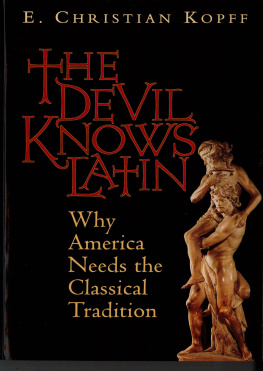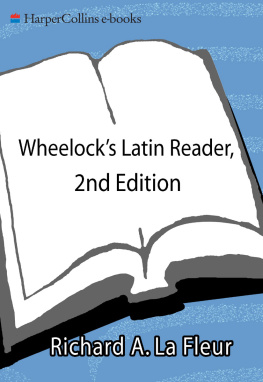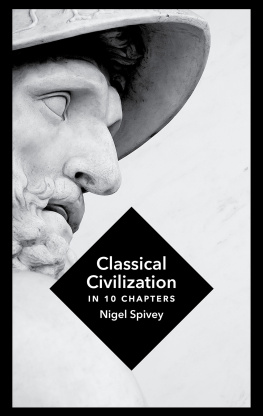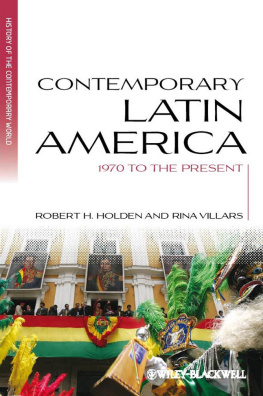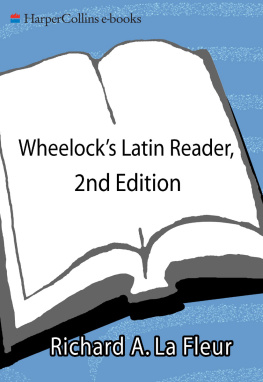THE DEVIL KNOWS LATIN
Why America Needs the Classical Tradition
E. C HRJSTIAN K OPFF
University of ColoradoBoulder

Matri carissimae
Away with him, away with him! He speaks Latin.
Henry VI, Part Two
CONTENTS
ACKNOWLEDGEMENTS
T he author would like to thank the editors of Chronicles (Rockford Institute), Academic Questions (National Association of Scholars), Modern Age (Intercollegiate Studies Institute), and the old Southern Partisan for commissioning the original versions of several chapters of this book. Parts of other chapters have been delivered before audiences as talks sponsored by the John Randolph Club, the Philadelphia Society, the National Association of Scholars, the Intercollegiate Studies Institute, and the Zenith Boosters Club of Kansas City. All have been revised and corrected. Chapters I, IV, VI, VII, XXI, XXII, the Epilogue, and the Appendix are original to this volume. I am especially grateful to the editors associated with ISI Books who skillfully guided this project to completion.
INTRODUCTION
I nnovation and constant change are the distinctive traits of modern life. They often seem the one certainty in this age. One hundred fifty years ago a young man with a doctorate in Classical Philology from the University of Jena (1841) said nearly the same thing about his own age: Constant revolutionizing of production, uninterrupted disturbance of all social conditions, everlasting uncertainty and agitation distinguish this epoch from all earlier ones. All fixed, fast-frozen relations, with their train of ancient and venerable prejudices and opinions, are swept away, all new-formed ones become antiquated before they can ossify.
So wrote Karl Marx in 1848, the year he penned the Communist Manifesto. As he knew from his classical studies, he was not the first person to feel this way. The confused middle-class hero of Aristophanes Clouds (423 B.C.), confronting the world of his day, cried out, Zeus has been overthrown and Whirl, constant swirling change, is King! But what to say about this situation? How to come to grips with it? Marxs answer was, All that is solid melts into air, all that is holy is profaned, and man is at last compelled to face with sober senses, his real conditions of life, and his relations with his kind.
Now, I agree wholeheartedly with Marx regarding the evanescence of the old ways, but I beg to differ with him on the actual conditions of human life and our relations with one another. The treasured things of the past, what seemed once solid and holy in bygone years, are indeed fading fast, but have they disappeared altogether? And if they have, is that a good thing? I contend it is not.
The purpose of this book is to suggest that the permanent things embedded in tradition are good things for human life, and that they have not yet entirely vanished from the Western landscape. Into the shadows of the gloom, admittedly real and growing, an occasional ray of light may shine, illuminating the vitality of tradition and the possibility of its restoration. Tradition is a hardy thing.
Though animated by a belief in the historically-grounded principles of classical republicanismincluding personal responsibility and limited self-governmentthis book is not a work of political theory. Rather, it is a series of essays about the health and vitality of Americas classical and Christian traditions, the errors of the current powers that be, and, most important, the ways in which creativity and order might be restored in spite of these powers. The book, as is fitting given the intellectual tradition that animates it, is both analytical and prescriptive.
By way of introduction to the central theme of the book, tradition, let me point out one important but often neglected fact, namely that everyone knows at least one tradition through personal experience: the tradition of ones native language. Traditions we value, whether science or Christianity, are best experienced in the tongues that helped form them. When Martin Luther called upon the councillors of the German cities to found and maintain Christian schools, he wanted the schools to teach the Sacred Tongues: Hebrew, Greek, and Latin. The languages are the sheath in which the sword of the Spirit is lodged, he explained. And he was right. Thomas Jefferson, John Stuart Mill, and Albert Jay Nock, men committed to the traditions of self-rule and science, insisted on instruction in the classical languages. Ronald Knox, a wise and witty Catholic priest, when asked to perform a baptism in the vernacular, refused with what his biographer Evelyn Waugh described as uncharacteristic acerbity: The baby does not understand English and the Devil knows Latin.
The mental infrastructure of our English society is founded on the vocabulary and syntax of Greek and Latin. Serious discourse in English, on law, medicine, and politics, in particular, depends heavily on words borrowed from Greek and Latin, and for that reason alone the study of the classical languages is important. But there is a more important reason. Studying the ancient tongues allows us to hear our ancestors talking and thinking. We cannot return to their day and age; we can, however, still share their education. We can read the books they read and think again the thoughts that excited or outraged them. The communication of the dead is tongued with fire beyond the language of the living, Eliot wrote. These are lines of communication we need to keep open.
We talk of creativity and the future, but we ignore the discipline of learning the rudiments of the past. I maintain that the past is our most important source of creativity. True creativity is always the acquisition of the old in order to fashion beautiful and meaningful things for the present. If we wish not to be a culture marked by servility, a terrible intellectual and moral error born in the absence of creativity, we must conserve the past. Tradition is, as the philosopher Josef Pieper viewed it, a challenge.
If we drop the baton of tradition while handing it to the next generation, we will be able to reckon the statistics: the number of jobs lost to other countries, of broken homes, of victims of drug addiction or physical violence. The root causes of these ills are moral and spiritualwe are not dealing just with drugs, but with incontinence, not just with unemployment, but with ignorance and, sometimes, disloyalty. To defeat them we must use words they and their Master recognize all too well: Vade retro, Satana! He will understand. Father Knox was right. The Devil knows Latin.
Man is intellectually nearsighted. He needs occasionally to clean his glasses of the dust that accumulates on them from carelessness and intellectual pollution. When he does so, he can see a stream of wisdom from the past, from contemporary wise men, and even from many still healthy sections of our popular culture. What follows is the record of one contemporary Americans efforts to keep his glasses clean and clear.
E. C HRISTIAN KOPFF
Boulder, Colorado
Chapter I
TRADITION AND THE LUNATICS

